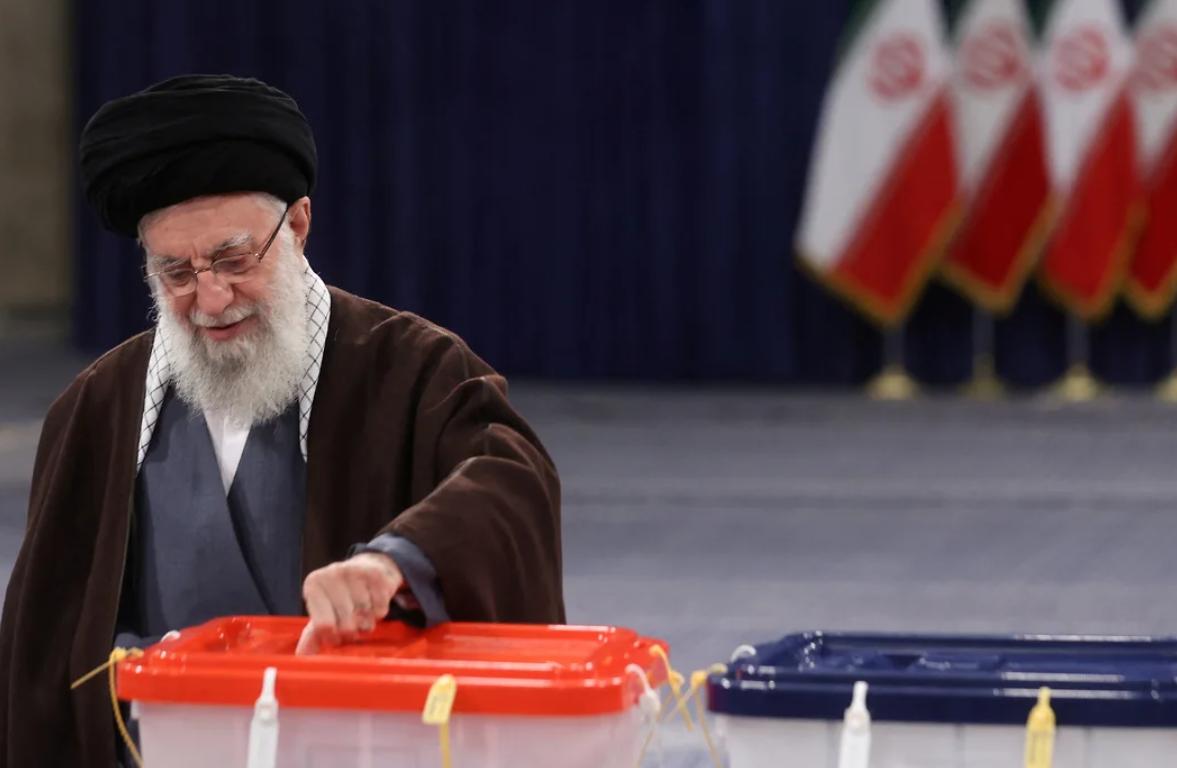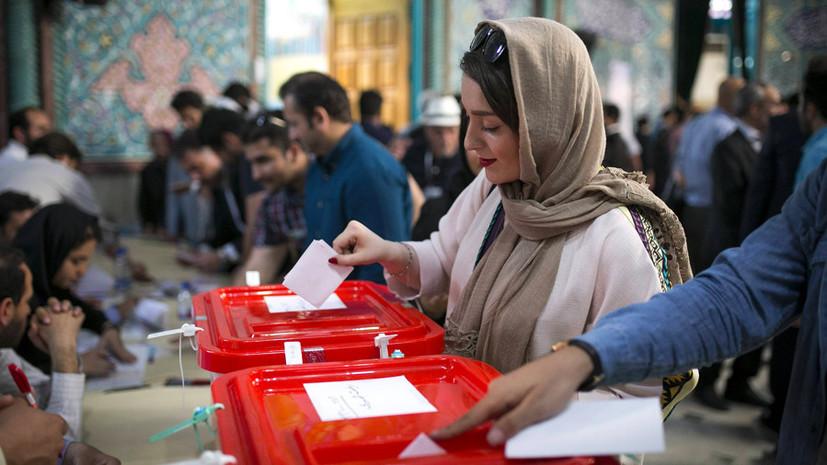Iran's ruling elite braces for worst-case scenario as low vote turnout heralds more riots Democratic heart in authoritarian exoskeleton
Polling stations opened in Iran early on March 1 morning. Television showed the country's 84-year-old Supreme Leader Ayatollah Ali Khamenei heading to vote. He said a large turnout would show national strength and would disappoint those opposed to Iran.
Despite the best efforts of the authorities, despite calls to vote for "a matter of national significance" and also to "humiliate the enemies of Iran", the turnout was the lowest ever, around 41 per cent. This means that, even according to official figures, the 'enemies' won rather than lost. At the same time, teachers in Iranian Kurdistan complained that officials threatened to fire them if they didn't turn out to vote. Iran is known for its leaders using this kind of intimidation to get millions of state employees to go to the polls.
The real power in Iran lies with the spiritual leader or Rahbar. Ali Khamenei has held that seat for 34 years. The power he wields is almost absolute. The Assembly of Experts, which elects the Rahbar, is elected every eight years but is actually full of Khamenei representatives. Another special body, the Guardian Council, also loyal to the Supreme Leader, carefully selects candidates for the presidency, parliament and Assembly of Experts, rejecting all those Khamenei dislikes.

In fact, even the winners make little difference; as former Iranian president Mohammad Khatami used to say, "The president is just someone who provides logistics for the Supreme Leader", simply put, oversees the economic bloc. The president here is a weak prime minister under a strong autocrat, and the role of parliament is rather ceremonial (although in the past, for example in the 1980s, these structures played a much more important role, and MPs still have some power on the ground, influencing life in their districts). Incidentally, presidential elections will be held in Iran in a year.
Yet Iranians have been keenly interested in what happens, not for years but for decades. Political scientists have argued that "a small, vibrant democratic heart beats inside the regime's heavy authoritarian exoskeleton". Iranian society, at least the majority, seemed to believe that something depended on it.
The scenario shattered in 2009 when four candidates - Mir-Hossein Mousavi, Mehdi Karroubi, Mohsen Rezaei and the incumbent Mahmoud Ahmadinejad, a protégé of the supreme leader - were allowed to run. Ahmadinejad lost. But the election was rigged, the winner, Mousavi, was put under house arrest, and the millions of Iranians who took to the streets in protest were dispersed by pro-regime militias and police. Hundreds of people were killed and thousands of demonstrators were thrown into prison.
Having crushed these protests (which became known in Iranian history as the Green Revolution), the regime decided not to leave anything to chance. The selection of candidates allowed to stand in the elections became increasingly restrictive. True, in 2013 a very moderate critic of the regime, the liberal reformer Hassan Rouhani, was allowed to be a candidate for the presidency. But after the 2022-2023 protests (the so-called Mahsa Amini protests in honour of the girl killed by the vice police for "wearing the hijab wrongly"), it became clear that even the slightest deviation from the scenario could lead to unpleasant consequences for the leadership, as the Iranian government is literally sitting on a powder keg.
As mentioned, real power lies in the hands of Supreme Leader Khamenei. But he is ageing (84). Power is gradually shifting into the hands of a second Iranian army. The IRGC, the Islamic Revolutionary Guard Corps, selects the most religious soldiers and officers. It is not only a 125,000-strong army and a network of intelligence services, but also the Basij, a militia that suppresses protests, and a giant corporation that owns about half of Iran's economy, including heavy industry, defence, water, telecommunications and oil exports.
Indeed, the IRGC is the core of the Iranian political and economic system, though other factions exist. The supporters of the IRGC are gradually pushing the clergy out of power ("the men in boots are seizing power from the men in turbans"). Among the latter, only those with good relations with the IRGC consolidate power. As the saying goes in Iran, the Supreme Leader has outsourced the country to the IRGC in return for a guarantee from the IRGC that he will remain in power. Corruption on a gigantic scale is inherent in this fusion of political, economic, ideological and judicial power (the courts are also controlled by corps supporters).
In effect, the country is run by millionaires linked to the IRGC. They are military officers, bureaucrats and their businessman relatives. Filling their pockets at the expense of the working people and distributing budget funds and government contracts among themselves, these people are ready to kill in order to maintain their position, not to mention the rigging of elections. But they do not shy away from the latter, either.
On Friday, 12,500 candidates were reportedly competing nationwide for 290 parliamentary seats, while 144 clerics entered the race for 88 eight-year seats in the Assembly of Experts. But the Guardian Council, which controls who gets to run, carried out a purge before the vote, disqualifying about half the registered candidates and barring from the race most of the critics and political heavyweights who could challenge the IRGC and Khamenei's proxies. This resulted in conservatives and those supporting the IRGC taking almost all the seats in Parliament.
Thus, the decisions of the office of the Supreme Leader and the most powerful generals of the IRGC now determine the composition of the parliament and the Assembly of Experts. This is a little different from simply appointing officials from above.
There are disadvantages here for the authorities. In effect, it is shrinking to its conservative core, sifting out all the wavering elements - from liberal reformers interested in liberalising the economy, robbing the people a little less blatantly (Khatami, Rouhani) and ending the confrontation with the West, to moderate constitutionalists who would like to concentrate more power in the hands of parliamentarians (Larijani).
Even Mahmoud Ahmadinejad, who crushed the protests in 2009, a conservative but still independent populist who dared to talk about limiting the power of the Supreme Leader and the need to help the poor, was excluded from the last presidential election.
A scenario in which the vast majority of voters do not turn out because their favourites are not allowed to run is dangerous for Iran's leadership. This is confirmed by US pollsters' research into the autumn 2019 uprising, another major protest movement outbreak. About half a million Iranians took to the streets and burned banks and government buildings after fuel price hikes. The authorities responded by killing about 1,000 Iranians in a week to quell the protests. The researchers found that the areas with the most riots were the areas with the least voters. Disenchantment with the system becomes a trigger for extra-systemic protest.
This scenario of a grassroots uprising, only more organised, is the greatest threat to the regime and even to part of the opposition. In 1978, a powerful national strike crippled the economy of the Shah's government. Then, on February 10-11, 1979, an uprising of workers, students, the poorest unemployed and small businessmen in Tehran finally overthrew the Shah's dictatorship (500,000 Iranians seized weapons from military depots and defeated the supporters of the monarchy in street battles in a matter of days).
This revolutionary scenario, in which factories and entire cities could end up in the hands of self-governing workers' associations - the rebellious working class - is the most dangerous even for many liberal oppositionists. In fact, the regime of the Islamic clerics and the IRGC was able to mobilise the urban classes of small businessmen and the conservative unemployed to suppress the effects of the labour revolt and to maintain its power in Iran in 1979-1980, but it knows very well how dangerous such processes are for it. So why do the authorities take risks and make elections a farce in a country as troubled as Iran?
The truth is that there is no good scenario for the ruling elite. The top authorities - members of Khamenei's office and the IRGC leadership - know they are deeply unpopular with the public. But that's exactly the point. Competing in the elections is also dangerous for them - they're going to lose, and then what happened in 2009 could happen again.
The main reason for their failure is the economy, undermined by corruption (use of budget funds) and American sanctions. Inflation is running at 40-50 per cent a year, according to official figures. Unofficial figures, published in the Iranian press, put it at over 100 per cent. Most people are impoverished, with some 60 per cent living at or below the poverty line. Iranians are simply fed up with all these powerful people and want them to go.
The most recent wake-up call has come from an official sociological survey carried out recently. The authorities asked how Iranians felt about religion. It turned out that the majority are not atheists. However, they believe that sincerity and honesty are more important than observing rituals. Most importantly, the separation of religion and state was supported by almost 73 per cent of Iranians. In the previous poll in 2015, only about 31 per cent were in favour. This spells disaster for Iran's theocracy, velayat-e faqih - the state of the highest jurisprudential theologian.

Once again, there are no longer any good scenarios for the leadership of Iran. The main point, however, is that the Supreme Leader, Ayatollah Ali Khamenei, is 84 years old and is often ill. A change in the country's leadership is likely in the near future. It is therefore important for the IRGC top brass to gain control of all institutions of power, including the presidency (the current president, Ebrahim Raisi, is also linked to the IRGC), the parliament and the Assembly of Experts, which will choose the next Supreme Leader.
The increasing isolation of the regime is the flip side of this policy. According to analysts at The Economist, the current policy is leading to a compression of the system to its very core, a loss of popularity and the exclusion of all moderate or wavering factions. That has repercussions. All opposition forces gather against the regime. The circle of aggrieved, disappointed and dissatisfied expands, for example at the expense of the sidelined reformists. They are "lurking behind the scenes, waiting for the hardliners to fail". In practice, this means that normally silent officials are now keen to inform foreigners about abuses of power by conservative, pro-Khamenei officials.
Those interested in changing Iran have different ideas about what Iran should or could become. There are few radicals, proponents of labour autonomy and class revolt. Some ambitious IRGC commanders aspire to the Pakistani model, where a multi-party parliamentary system coexists with a powerful military top brass capable of intervention in the political process at any time.
Reformists, regime officials sidelined by the leadership, dream of a concentration of power in the hands of the parliament and a moderate supreme leader. Many opposition-minded citizens want a normal parliamentary republic and a liberalised economy.
Some dream of restoring the Shah's monarchy, and there are many. But there is a consensus that the Iranian model of vilayat-e faqih (the state of the religious jurisprudent theologian) has had its day. A theocracy in a country like Iran, where the population is prone to riots and strikes, cannot remain stable when the overwhelming majority of the population is in favour of secular reforms and the separation of religion and state.








